|
|
|
Sort Order |
|
|
|
Items / Page
|
|
|
|
|
|
|
| Srl | Item |
| 1 |
ID:
129558
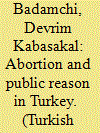

|
|
|
|
|
| Publication |
2014.
|
| Summary/Abstract |
During May and June 2012, the question of abortion was hotly debated in Turkish public forums. This paper analyzes the main characteristics of this abortion debate using John Rawls's conception of public reason as a normative framework. In doing so, speeches and declarations on abortion made by legislators are critically evaluated. The arguments in the debate are examined with a view to interpret how the issue should be discussed as far as the demands of public reason are concerned. From a Rawlsian framework, it is observed that the pro-ban position (Adalet ve Kalk?nma Partisi) is far from contributing to a reasonable balance of political values on abortion whereas the contra-ban position (Cumhuriyet Halk Partisi) satisfies the demands of public reason. Moreover, it is argued that, the latest proposed legislation on abortion cannot be viewed as an outcome of a reasonable balance of political values but is rather an outcome of pragmatic compromise.
|
|
|
|
|
|
|
|
|
|
|
|
|
|
|
|
| 2 |
ID:
174930
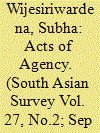

|
|
|
|
|
| Summary/Abstract |
In Sri Lanka, abortion continues to be a criminal offence under the Penal Code of 1883. Several attempts have been made to challenge the colonial-era law since the 1990s with no success thus far. This study documents and centres the knowledge of women and transpersons in accessing abortion and sexual health and reproductive health services in Sri Lanka in order to contribute to the conversation on abortion law reform as well as research and advocacy. Our data suggest that the existing legal reforms proposed to the abortion law would be unresponsive to the needs of women and transpersons in Sri Lanka, and that in additional to legal changes, we would need significant social and cultural changes. This study uses feminist research methodologies, building towards a feminist ethics in abortion research.
|
|
|
|
|
|
|
|
|
|
|
|
|
|
|
|
| 3 |
ID:
187179
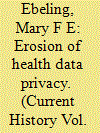

|
|
|
|
|
| Summary/Abstract |
The COVID-19 pandemic has presented lessons on using health data to improve, save, and protect lives, and the need to improve the stewardship of health privacy. Before the pandemic, the United States already had a broken health data system, fragmented and dominated by public-private partnerships in which the businesses involved sought to commercialize patient data. More than two years into the pandemic, in many respects health data privacy is even more fractured and prone to being misused to profiteer and to harm rather than help the most vulnerable. Health data is now being used by law enforcement to criminalize abortion and undocumented immigration, making reform an urgent necessity.
|
|
|
|
|
|
|
|
|
|
|
|
|
|
|
|
| 4 |
ID:
186392
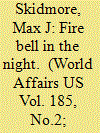

|
|
|
|
|
| Summary/Abstract |
Abortion is an issue around the world, varying in intensity by location. In the United States, it generates enormous controversy, especially because Protestant fundamentalists have joined Roman Catholics in strenuous opposition and have essentially captured one of the two major political parties. This extended commentary essay contends that anti-abortion arguments are flawed and that an effective anti-abortion policy requires a harsh authoritarian, if not totalitarian, government, fueled by misogyny and disregard for human rights. Such policies force pregnant women into what must be described as a condition of slavery.
|
|
|
|
|
|
|
|
|
|
|
|
|
|
|
|
| 5 |
ID:
189697
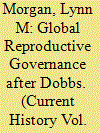

|
|
|
|
|
| Summary/Abstract |
The 2022 US Supreme Court decision Dobbs v. Jackson Women’s Health overturned the constitutional right to abortion, raising questions about the international implications of the ruling. The Dobbs decision reveals a growing rift in global reproductive governance between countries that rely on international human rights standards and those that do not. The global momentum is currently with the human rights contingent, but the Dobbs ruling reflects the logic of a global antiabortion coalition that would like each country to decide its own life and family laws, without interference from multilateral agencies, based on its own constitution, history, and traditions.
|
|
|
|
|
|
|
|
|
|
|
|
|
|
|
|
| 6 |
ID:
155545
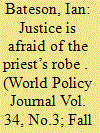

|
|
|
|
|
| Summary/Abstract |
Lucia was 15 when she became pregnant. The news was a shock to her family: Lucia didn’t have a boyfriend and spent her time doing homework and singing in the church choir. But amid tears, the girl revealed to her mother that the local priest had been raping her for the past two years. Journalist Ian Bateson reports on how Nicaragua’s total ban on abortions, backed by President Daniel Ortega, has left girls like Lucia without options, and how a handful of women’s rights groups are fighting back.
|
|
|
|
|
|
|
|
|
|
|
|
|
|
|
|
| 7 |
ID:
080366
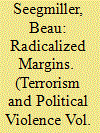

|
|
|
|
|
| Publication |
2007.
|
| Summary/Abstract |
In recent years we have witnessed a growing body of scholarship that asserts that religion often motivates violence; anti-abortion violence is presented as a prominent example. Through examining the rhetoric and actions of anti-abortion bomber Eric Rudolph, I question the centrality of religion when invocations of divine authority or apocalyptic narratives are conspicuously absent in his justificatory writings. I argue that other social, political, and strategic considerations are more significant in the emergence of a radicalized anti-abortion movement than religion. This analysis nuances notions of a causal relationship between religion and violence and calls for interrogation of the category
|
|
|
|
|
|
|
|
|
|
|
|
|
|
|
|
| 8 |
ID:
106373
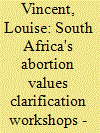

|
|
|
|
|
| Publication |
2011.
|
| Summary/Abstract |
A rich literature exists on local democracy and participation in South Africa. While the importance of participation is routinely built into the rhetoric of government, debate has increasingly focused on the dysfunctionality of participatory mechanisms and institutions in post-apartheid South Africa. Processes aimed ostensibly at empowering citizens, act in practice as instruments of social control, disempowerment and cooptation. The present article contributes to these debates by way of a critique of the approach used by the South African state, in partnership with the non-governmental sector, in what are called abortion 'values clarification' (VC) workshops. This article examines the workshop materials, methodology and pedagogical tools employed in South African abortion VC workshops which emanate from the organization Ipas - a global body working to enhance women's sexual and reproductive rights and to reduce abortion-related deaths and injuries. VC workshops represent an instance of a more general trend in which participation is seen as a tool for generating legitimacy and 'buy-in' for central state directives rather than as a means for genuinely deepening democratic communication. The manipulation of participation by elites may serve as a means to achieve socially desirable goals in the short term but the long-term outlook for a vibrant democracy invigorated by a knowledgeable, active and engaged citizenry that is accustomed to being required to exercise careful reflection and to its views being respected, is undermined. Alternative models of democratic communication, because they are based on the important democratic principles of inclusivity and equality, have the potential both to be more legitimate and more effective in overcoming difficult social challenges in ways that promote justice.
|
|
|
|
|
|
|
|
|
|
|
|
|
|
|
|
| 9 |
ID:
121045
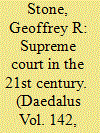

|
|
|
|
|
| Publication |
2013.
|
| Summary/Abstract |
How does the Supreme Court serve the "common good"? What is the Court's responsibility, as the ultimate interpreter of the Constitution, in our constitutional system of government? This essay explores that question with an eye on the recent performance of the Court in highly controversial and divisive cases. What explains the Court's decisions in cases involving such issues as campaign finance regulation, gun control, abortion, affirmative action, health care reform, voting rights, and even the 2000 presidential election? This essay argues that there is a right and a wrong way for the Supreme Court to interpret and apply the Constitution; and whereas the Warren Court properly understood its responsibilities, the Court in more recent decades has adopted a less legitimate and more troubling mode of constitutional interpretation.
|
|
|
|
|
|
|
|
|
|
|
|
|
|
|
|
| 10 |
ID:
144413
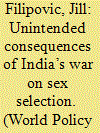

|
|
|
|
|
| Summary/Abstract |
India’s ban on sex-selective abortions in 1994 was designed to increase gender equality and send the message that girls and women are valued in society. But the law has also come at a cost, according to Jill Filipovic. Many poor women now find that they can’t access second-trimester abortions at all. The policy’s implementation raises a crucial question: “Can you promote the rights of women and girls and also restrict their family choices?”
|
|
|
|
|
|
|
|
|
|
|
|
|
|
|
|
|
|
|
|
|